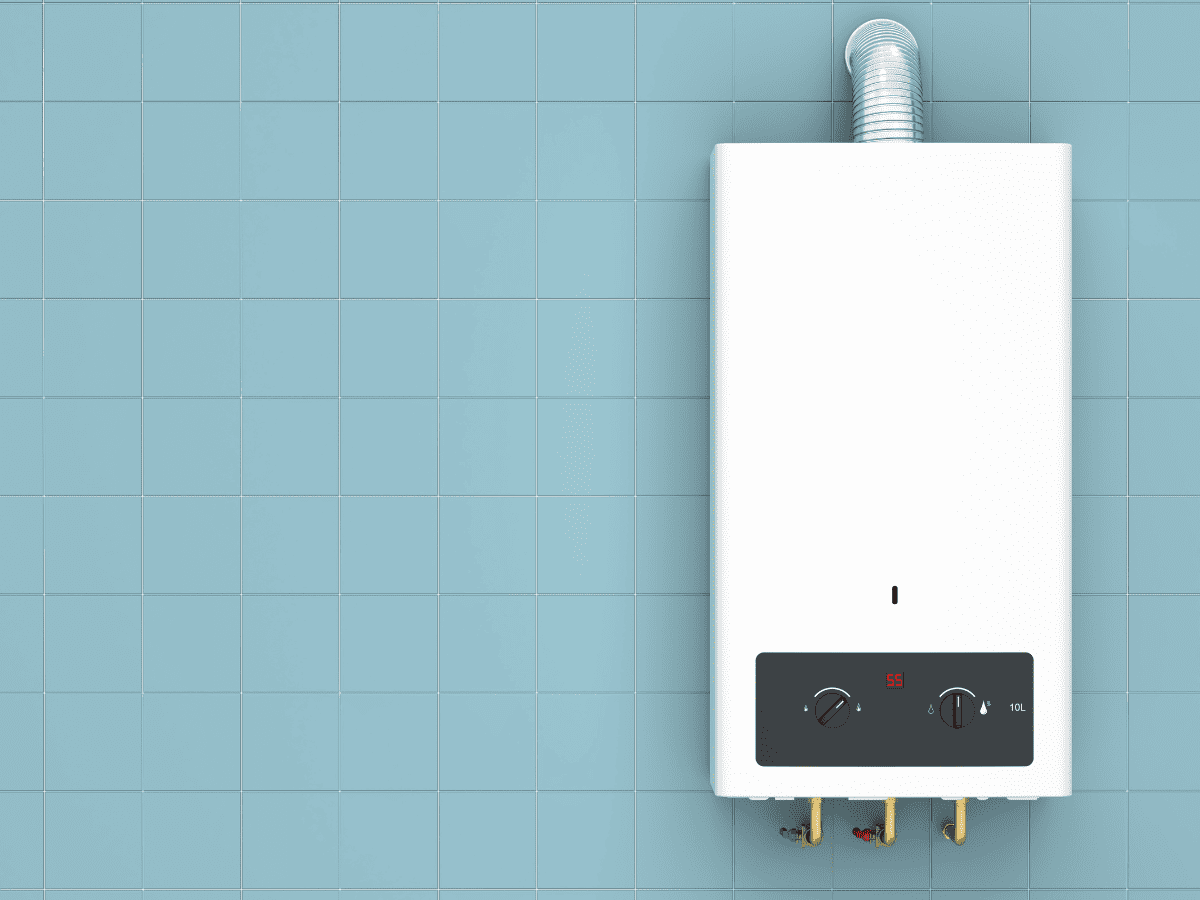Have you ever wondered how does a tankless water heater work? It’s a common question among homeowners looking to upgrade their hot water systems. Tankless water heaters have become increasingly popular thanks to their energy-efficient design and space-saving benefits. But how do they work?
By the end of this article, you’ll better understand how a tankless water heater works and whether it’s the right choice for your home. So, let’s dive in and explore the world of tankless water heaters!
Science Behind Water Heaters: How Does A Tankless Water Heater Work?
Tankless water heaters have been around for years, but many people are still unfamiliar with how they work. Unlike traditional water heaters that store and heat a large tank, tankless water heaters heat water on demand as it flows through the unit. This process relies on advanced technology and scientific principles to ensure a constant hot water supply.
The main element of a tankless water heater is the heat exchanger. This compact device sits inside the unit and is responsible for heating the water as it flows through it. The heat exchanger is typically made of copper or stainless steel and is designed to withstand high temperatures and pressures.
When water flows through the heat exchanger, it is heated by either a gas burner or an electric element. In gas tankless water heaters, a gas valve opens when hot water is requested, and the burner is ignited, heating the water as it flows through the heat exchanger. An electric element heats the water through the heat exchanger in electric tankless water heaters.
Flow sensors are used to detect when hot water is being requested, triggering the heating process. The flow sensors are vital to ensure that the tankless water heater only heats water when needed, reducing energy usage and lowering energy bills.
One of the drawbacks of traditional water heaters is that they are prone to scale buildup over time, reducing their efficiency and lifespan. On the other hand, tankless water heaters are designed to prevent scale buildup through advanced technology, such as water filters and heat exchanger materials that resist buildup.
Overall, tankless water heaters offer many benefits over traditional water heaters. They provide a continuous hot water supply on demand, are more energy-efficient, and take up less space. However, they require an initial investment and may have higher installation costs, depending on the size and energy source.
Types of Tankless Water Heaters: Electric and Gas
Tankless water heaters are an excellent solution for homeowners and businesses looking for a continuous hot water supply while saving on energy bills. Technological advancements have made these systems more efficient and affordable, making them popular for modern homes and businesses.
There are two types of tankless water heaters: electric and gas. Each has advantages and disadvantages, and choosing one over the other will depend on several factors, including energy source availability and flow rate requirements.
Electric Tankless Water Heaters
Electric tankless water heaters are powered by electricity, making them a popular choice for areas where gas is not readily available. They are also easy to install and require little maintenance, making them an attractive option for homeowners that want a hassle-free solution.
One of the primary advantages of electric tankless water heaters is they are more energy-efficient than traditional water heaters. They only heat water when needed, reducing energy usage and lowering energy bills. However, there may be better options for homes with high demand as they have lower flow rates compared to gas tankless water heaters.
Gas Tankless Water Heaters
Gas tankless water heaters are powered by gas and are a popular option for areas with a natural gas supply. They are known for their high flow rates, which makes them suitable for households with high hot water demands.
One of the primary advantages of gas tankless water heaters is their ability to deliver hot water faster than electric units. They are also more efficient than traditional water heaters, providing a continuous hot water supply without wasting energy. However, gas tankless water heaters require annual maintenance and proper ventilation to prevent the release of harmful gases.
The type of tankless water heater you choose will depend on your energy source availability, flow rate requirements, and other factors like your budget and maintenance preferences. Both electric and gas tankless water heaters offer significant advantages over traditional water heaters, including increased energy efficiency and lower energy bills. Take the time to research both options and consult with a qualified professional to find the best solution for your home or business.
Benefits of Tankless Water Heaters
Tankless water heaters have been gaining in popularity in recent years and for good reason. These innovative appliances offer many benefits over traditional water heaters, making them an attractive option for homeowners and businesses. Here are some of the key benefits of tankless water heaters:
Water on Demand: With a tankless water heater, you can enjoy a continuous supply of hot water on demand. This means no more waiting for your storage tank to fill up before you can shower or do the dishes. Tankless water heaters heat water as it flows through the unit, providing hot water whenever needed.
Energy Efficiency: Tankless water heaters are more energy-efficient than traditional water heaters because they only use energy when hot water is needed. This means you can save money on energy bills over the long term. Tankless water heaters are up to 34% more energy-efficient than traditional water heaters.
Lower Operating Costs: Not only are tankless water heaters more energy-efficient, but they also have lower operating costs over their lifespan. Traditional water heaters have a storage tank that must be constantly heated to keep the water hot, which can be expensive and wasteful. On the other hand, tankless water heaters only use energy when hot water is needed, resulting in lower operating costs and less waste.
Space-Saving Design: Tankless water heaters are much smaller than traditional water heaters because they don’t have a bulky storage tank. This means they take up less space in your home or business, freeing up valuable space for other uses.
Longer Lifespan: Tankless water heaters have a longer lifespan than traditional water heaters, often lasting up to 20 years or more. This means you’ll save money in the long run because you won’t need to replace your water heater as often.
Improved Water Quality: Because tankless water heaters don’t have a storage tank, there is less opportunity for bacteria and other contaminants to grow in the water. This can result in improved water quality and fresher-tasting water for your home or business.
Installation and Maintenance
Installing a tankless water heater may seem daunting, but it can be a relatively straightforward process with the correct information and tools. Proper maintenance ensures your tankless water heater operates efficiently for years. Here are some essential tips for tankless water heater installation and maintenance.
Installation:
1. Choose the Right Location: Tankless water heaters can be installed indoors or outdoors, so choose a location that provides adequate ventilation and easy access for servicing.
2. Hire a Professional: While a homeowner with DIY skills can install tankless water heaters, hiring a professional is recommended to ensure the installation is done correctly.
3. Confirm Gas and Electrical Connections: Ensure your tankless water heater is properly connected to the gas and electrical supply. Gas tankless water heaters require proper venting to the outside to exhaust carbon monoxide safely.
4. Follow the Manufacturer’s Instructions: Follow the manufacturer’s instructions for installing the unit and connecting the water supply and drainage pipes.
Maintenance:
1. Check for Scale Buildup: Tankless water heaters are susceptible to mineral buildup, particularly in hard water areas. Regular flushing with a descaling solution can prevent scale buildup and maintain efficiency.
2. Inspect the Air Supply: Gas-powered tankless water heaters require access to adequate air supply for proper combustion. Make sure the air supply is free from blockages and debris.
3. Check the Heat Exchanger: The heat exchanger is the key component of a tankless water heater. Regularly checking can catch leaks or other issues before they become more significant problems.
4. Clean or Replace Filters: Many tankless water heaters have filters that need to be cleaned or replaced periodically to maintain proper flow rates and water quality.
In conclusion, properly installing and maintaining your tankless water heater ensures efficient operation and a long lifespan. By following these tips, you can enjoy a continuous hot water supply while minimizing energy consumption and costs.





